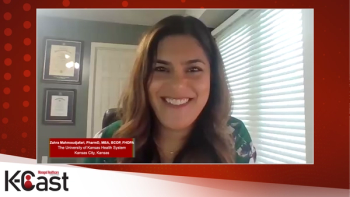
Winner of Journal of Clinical Oncology's Young Investigator Award Discusses His CAR-T Research
MD Anderson’s Patrick Reville says preclinical research shows combining CAR-T therapy with other treatments may make it more effective as treatment for large B cell lymphomas.
The life work, so far, of
The research is notable as relapsed and refractory LBCL patients have poor long-term outcomes, and 40 to 60% of patients relapse after or are refractory to the CAR-T treatment, Reville told Managed Healthcare Executive®.
Managed Healthcare Executive® recently spoke with Reville about his CAR-T research and his recent Journal of Clinical Oncology’s
Please describe your research at MD Anderson Cancer Center and why you wanted to focus on large B-cell lymphomas and CAR-T cell therapy.
My research focuses on how and why CAR T cell therapy work or fails to work in patients with hematologic malignancies with a specific focus for this project on large B cell lymphoma. I focus mainly on the T cell side of the story.
There are multiple reasons why these therapies are or aren’t successful. For example, this can be because of how specific features of the cancer itself (such as different mutations in the cancer that make T cell therapies work better or less well), the microenvironment within the tumor that may make more or less hospitable for T cell therapy to work, or intrinsic factors of the T cells themselves.
For this project, we are using a CD38-targeting, T-cell engaging antibody in combination with CD19 CAR-T cell therapy to see if that combination is more successful at killing lymphoma cells. Our preliminary work has shown the combination is better than either one alone.
We are interested in large B cell lymphoma because this is the most common indication for CAR-T therapy in the adult population currently. There are still unmet needs to improve CAR-T therapy in these patients. However, we hope these concepts will be applicable to other types of cancers for which we could use CAR-T therapy.
Is CAR-T therapy working for large B cell lymphomas?
I would say that CAR-T therapy is working very well for large B cell lymphomas. They have been a big success and more and more patients are getting good responses and cured with this approach. Based on the most recent data, we are likely getting good disease control (potentially curing) in about 40% to 60% of patients we treat with large B cell lymphoma with CAR-T treatment in the relapsed/refractory setting. This is an amazing achievement.
However, there is still work to be done for the remaining patients that will relapse after or be refractory to the CAR-T treatment. That is the area we are focusing on. Can we add additional drugs and treatments to CAR-T therapy to improve on the response rate and hopefully increase the proportion of patients we cure?
What stage are you at in the CAR-T research?
This is still pre-clinical research. Everything we are testing is either in vitro or in animal models. We are using model systems in the lab that are representative of patients in the clinic. This includes making CAR-T cells in the lab using T cells from lymphoma patients, using lymphoma cell lines derived from patient tumors, and using patient derived xenograft mouse models, which are patient tumor samples that we can grow in mice. We expect that using systems in the lab that closely mimic the clinic, using patient tumor samples, that our results will be reproducible and can be translated to the clinic assuming we see the positive results we hypothesize we will find.
What did it mean to you to receive the Young Investigator Award?
It really means a lot to be recognized by Conquer Cancer Foundation, the American Society of Clinical Oncology, and Journal of Clinical Oncology with this award. The fact that someone can see both the potential in the projects we are working on as well as support for me personally is amazing. We are always working extremely hard in the lab to make meaningful advancements in the care we provide to our patients in the clinics.
Both the recognition of this work and the money to help support the mission is invaluable.
How will the award and the funding help you further your research?
The YIA award provides $50,000 in research funding over a one-year period. This money will be critical to us completing the planned experiments. Additionally, early career awards are critical to my personal success as an aspiring clinician scientist.
What would you like to be remembered for, professionally and personally?
This is really a difficult question to answer. More than anything, I want to be remembered as a caring and compassionate doctor to my patients. I want to be a trusted and respected colleague to the people I work with in the lab and in the clinic. I hope to be successful with the research I am doing and known as someone that contributed in a meaningful way both to scientific inquiry as well improving the lives of patients with cancer.
Newsletter
Get the latest industry news, event updates, and more from Managed healthcare Executive.



















